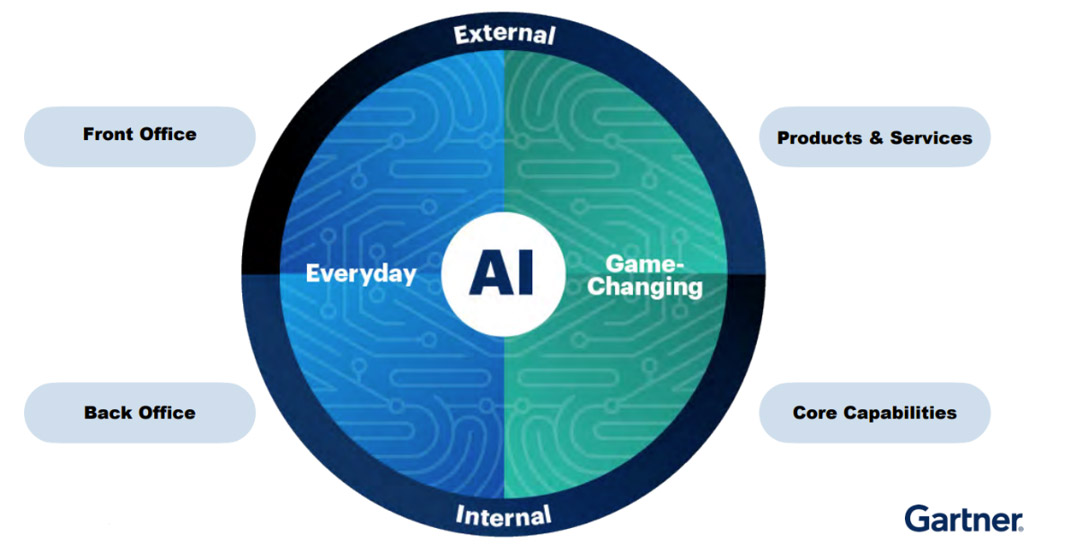
Incremental vs. Game-Changing Innovation with Generative AI in Information Services
December 4, 2023
According to a recent Gartner report, generative AI falls into two categories: everyday and game-changing:
- Everyday AI focuses on improving productivity, enabling workers to perform existing tasks faster and more efficiently. This is the primary area of investment for most businesses, and it drives incremental improvement along the margins.
- Game-changing AI focuses on creativity. It doesn’t just make people faster or better, but instead creates new results or new ways to create results. This use case is transformational, and has the potential to disrupt business models and industries.
Calculating the ROI of generative AI
Nearly three-quarters of all executives are calling generative AI a “top investing priority.” As such, there’s pressure for this technology to generate an ROI as quickly as possible. The question executives need to ask is: which is more likely to drive massive ROI—incremental improvement or transformational, disruptive products? Everyday generative AI can improve efficiency and, as a result, reduce expenses. While this is not negligible, there’s an even more powerful opportunity here that far too few have realized: the ability to drive new revenue through transformational, disruptive change.
Here are three use cases specific to information services to illustrate what we mean:
Everyday generative AI can improve efficiency and, as a result, reduce expenses. While this is not negligible, there’s an even more powerful opportunity here that far too few have realized: the ability to drive new revenue through transformational, disruptive change.
Here are three use cases specific to information services to illustrate what we mean:
- Transformational impact on product design. Generative AI will transform how we think about product design. It simplifies search and enables faster delivery of insights at the customer’s point of need.
- Accelerating insights generation. Users prompt the AI engine with a question, which pulls from existing data sets to generate opportunities for cross-sell, deeper connections, enriched answers, and more comprehensive insights than before.
- Answering complex questions. Companies are charged with answering increasingly complex questions. Generative AI can aggregate data from diverse and disparate data sources to deliver more comprehensive answers faster than ever.
How to harness the power of game-changing AI
The use cases listed above are powerful examples of how generative AI can transform information services business models. But if you’re going to generate an ROI from this new technology, you need a clear idea how it will serve your users specifically. Game-changing AI is only valuable if you leverage it to drive customer, user, and business value. Here are some steps you can take to ensure your information services company is prepared to achieve this goal.Reimagine the product experience
Simon Sinek in The Infinite Game distinguishes between finite and infinite games. In finite games, like football or chess, the players are known, the rules are fixed, and the endpoint is clear. In infinite games, like business or politics or life itself, players come and go, the rules are changeable, and there is no defined endpoint. Game-changing generative AI relies on your ability to succeed at imagining infinite games by changing the rules. There’s that famous quote attributed to Henry Ford: “If I had asked people what they wanted, they would have said ‘faster horses.’” You can’t merely focus on building smarter, faster, better versions of the technology you already have. Instead, you need to find more efficient ways to deliver user value.Start with customer-centricity
If you’re going to reimagine the product experience, you need a touchpoint around which to orient that transformation. That touchpoint, fundamentally, is the customer themselves. The more deeply you understand your customer—their wants, needs, challenges, struggles, pain, desires, incentives—the more you’ll understand the specific value you need to deliver. This requires you to explore, ideate, prototype, and validate new ways of thinking about customer problems. Although generative AI is a new technology, this principle is as old as time. In fact, 3Pillar Global has an extensive track record helping companies build for user and business value, focusing on features, functionality, and platforms that customers actually use. We’re technology-agnostic and customer-centric for a reason. Chasing technology will cost you money, while solving for your customer needs with the right technology, based on user needs will deliver ROI. In the ongoing battle for AI success, this is far more valuable than an army of a hundred machine learning or AI engineers. Because, at the end of the day, if you don’t know what you’re building toward, you open yourself to serious risk and all your investment will go to waste.Make sure your data is AI-ready
Generative AI is only as good as the data used to build and train it. At the risk of over-simplification, it’s an input vs. output situation. Good inputs lead to good outputs. Bad inputs lead to bad outputs. This is why 3Pillar advocates having a unified data store, processed in the cloud, and made available to all your AI models. Essentially, you’re wrangling the data across its entire lifecycle, balancing accessibility and security to ensure the right velocity of data is made available for insights generation and advanced analytics. In addition to data readiness, it’s critical that your machine learning operations (MLOps) are also prepared to manage and productize your generative AI models. MLOps can drive efficiency, scalability, and risk reduction, enabling faster results to information requests and increased compliance with your organization’s policies. LEARN MORE: The Information Services Guide to AI ReadinessTransform your team
Game-changing AI will require you to transform your team, acquiring the skill sets and expertise necessary to reimagine and deliver new value to users and customers. This can involve both training your existing team, and also bringing in outside experts to accelerate the process. Among the skills sets you need to achieve game-changing generative AI success include:- User Research Experts. These people deeply understand users, customer journeys, and customers’ goals, pain points, and jobs to be done.
- AI Product Designer. These people translate an understanding of user needs and goals into AI-powered product experiences.
- AI Product Manager. These people understand the complex interactions of customer needs, business needs, and AI capabilities.
- AI / ML Engineers. It goes without saying that to build an AI-based product, you need someone who gets how AI and ML work.
- Data Scientists. Data quality is key to AI readiness. Fortunately, most information services companies have in-house data scientists who can meet this need.
Final thoughts
Success with game-changing generative AI is all about increasing the pace of customer-centric innovation, both internally for your company and externally for your user. When you take the time to invest in new technologies like generative AI, think carefully about how you’ll drive user value, and make sure you have the right team in place to execute. But especially, you need to challenge yourself and your organization to pursue “game changing” innovation—don’t simply improve on the margins. This approach will open up new revenue streams and empower you to be proactive, not just reactive. As mentioned above, 3Pillar Global can provide the guidance and expertise to maximize the ROI of your generative AI investment. Learn more by meeting with our team today.About the Author

BY
SHARE
Recent blog posts

Stay in Touch
Keep your competitive edge – subscribe to our newsletter for updates on emerging software engineering, data and AI, and cloud technology trends.



